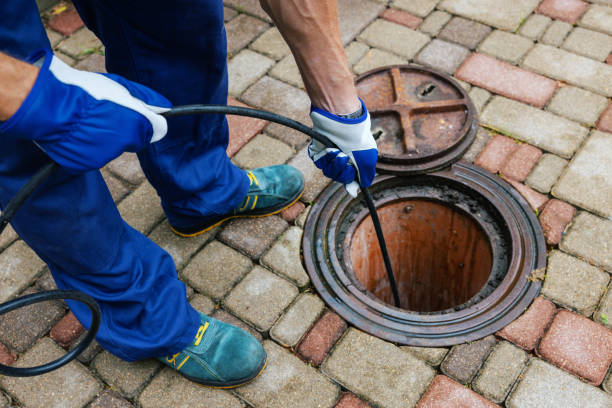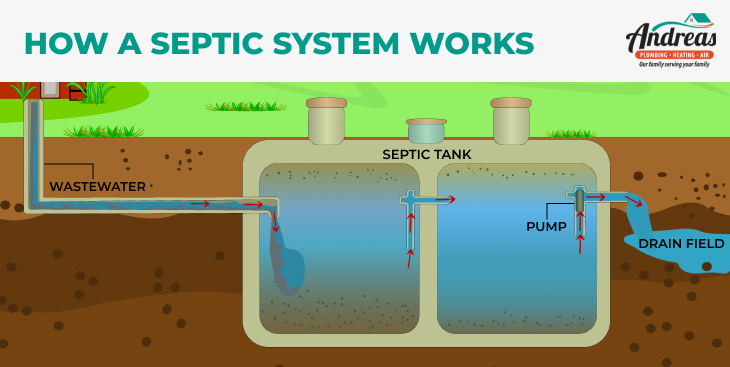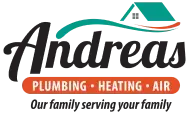
Choosing between a septic system and a public sewer system is an important decision for Pennsylvania homeowners. Each option has unique advantages and disadvantages, and the best choice often depends on various factors, including location, environmental regulations, and personal preferences.
In this blog post, the plumbing professionals at Andreas Plumbing, Heating & Air Conditioning explain the key differences between septic and sewer systems and help you decide which is best for your Pennsylvania property.
[cta_shortcode]
What Is a Septic System?
A septic system is an independent, on-site wastewater treatment system that is not connected to the public sewer system. It efficiently treats and disposes of household wastewater through natural processes. Here’s how it works:
- Septic tank: Wastewater from the home flows into an underground septic tank, where solids settle to the bottom, forming sludge, while oils and grease float to the surface, forming scum. The tank holds the wastewater long enough for solids to separate from the liquid.
- Drain field: The liquid wastewater, or effluent, flows from the septic tank into a drain field (or leach field). The leach field consists of a network of perforated pipes buried in shallow, gravel-filled trenches. As the effluent is released into the soil, natural processes further treat it.
- Pump: This is an optional element of your septic system. The pump moves the effluent from the septic tank to the drain field, especially if the field is located uphill from the tank or at a considerable distance.

How Do Public Sewer Systems Work?
Public sewer systems are centralized wastewater collection and treatment systems managed by local municipalities or private companies. These systems transport wastewater from homes and businesses to a central treatment facility. Here’s how they operate:
- Collection: Wastewater from homes flows through a series of underground pipes to a central sewer line.
- Transport: The central sewer line carries the wastewater to a treatment facility, which may involve a combination of gravity and pumping stations to move the wastewater over long distances.
- Treatment: At the treatment plant, wastewater undergoes several stages of treatment to eliminate contaminants and make the water safe to return to the environment or reuse.
Is a Public Sewer System Better in Pennsylvania?
Deciding whether a public sewer system or a septic system is better for homes in Pennsylvania depends on several factors:
Population Density & Land Availability
Public sewer systems are often more practical and economical in densely populated urban areas due to the high concentration of homes and businesses. By contrast, rural or suburban areas with lower population densities may find septic systems more suitable because they don’t require extensive infrastructure and can be installed on individual properties.
Environmental Regulations
Environmental regulations in Pennsylvania may also impact the choice between septic and sewer systems.
In Pennsylvania, the Department of Environmental Protection dictates that solids should be pumped out of the septic tank once every three years or when the tank is more than one-third full of solids or scum. Public sewer systems are typically subject to rigorous regulations and oversight to ensure compliance with environmental standards.
Cost Comparison
The cost of installing a septic system can vary depending on soil conditions, site accessibility, and system design. Septic systems generally have a lower upfront cost than connecting to a public sewer system.
However, septic systems require regular maintenance, including pumping the septic tank every three years and routine inspections. Public sewer systems usually involve monthly or quarterly service fees on utility bills, covering the cost of maintaining and upgrading the sewer infrastructure.
Contact Team Andreas To Schedule Sewer Services
Do you need help deciding which solution is best for your needs? Trust the team at Andreas to deliver the septic system services you need.
Whether you’re looking to connect to the public sewer system or are seeking septic tank installation, inspection, or repair, we can help. With 24/7 emergency service availability and an unparalleled commitment to honesty, integrity, and hard work, we can provide the lasting septic solutions you need.
Book septic tank services in Eastern Pennsylvania by contacting our team. Schedule your appointment today.
